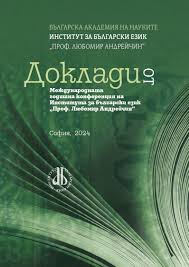Конструкцията Dativus absolutus в старобългарски, староанглийски и готски евангелски текстове
Dativus Absolutus in Old English, Old Bulgarian and Gothic Gospel texts
Author(s): Antoaneta Dzhelyova, Maria Anastasova
Subject(s): Language studies, Language and Literature Studies, Applied Linguistics, Syntax, Historical Linguistics, Comparative Linguistics, Descriptive linguistics, South Slavic Languages
Published by: Институт за български език „Проф. Любомир Андрейчин“, Българска академия на науките
Keywords: absolute constructions; syntactic analytic structure; quasi-subject-quasi-predicate syntagm; quasi-object-quasi-predicate syntagm
Summary/Abstract: We interpret dativus absolutus structurally as a syntactic analytic construction with two major components– a main one (a participle) and a subordinate one (a substantive), and content-wise we treat dativus absolutus as a quasi-subject-quasi-predicate or quasi-object-quasi-predicate syntagm analogous to a subject-predicate syntagm with a finite verb. Dativus absolutus is one of the manifestations of a common typological phenomenon of the Indo-European languages – the expression of predication through a non-finite verb form and a substantive in an oblique case.
- Page Range: 269-278
- Page Count: 10
- Publication Year: 2024
- Language: Bulgarian, Gothic
- Content File-PDF

